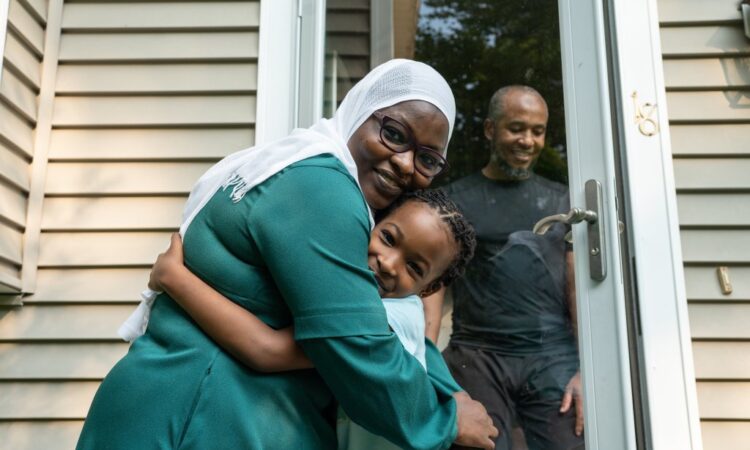
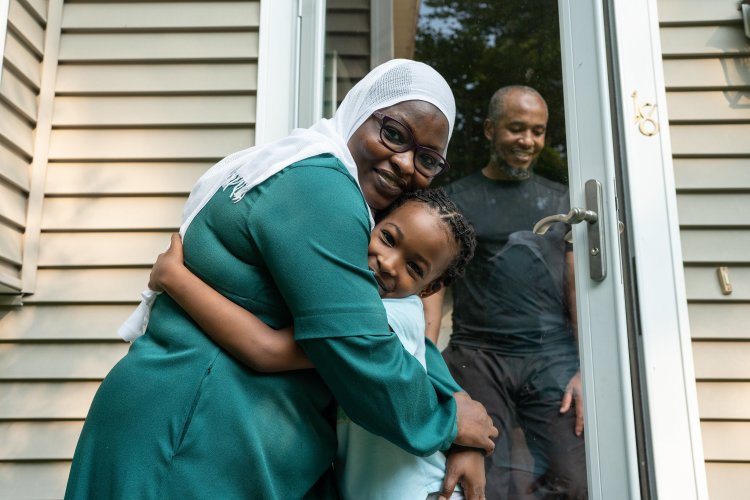
Ahsana Abeza, 9, with her mother, Sophie Mutamuliza, and father, Adam Abeza, at their new home in New Gloucester on Wednesday. The family had been renting an apartment in Portland for many years and was finally able to buy a house through a new program offered by Androscoggin Bank that complies with Sharia law. Sofia Aldinio/Staff Photographer
Sophie Mutamuliza and Adam Abeza came to the United States from Rwanda 10 years ago, eager to pursue the American dream.
By 2016 they had settled in Portland and began saving to buy a house for their growing family. A few years later they were ready to spend their nest egg, but no bank in Maine offered a mortgage that didn’t charge interest, which is haram, or forbidden, by their Islamic faith.
So they had to wait, stuck in a Portland apartment.
Finally, in February, the couple and their four children, ages 2-12, held a housewarming party in the cozy split-level ranch they purchased with a halal, or permitted, mortgage provided by Lewiston-based Androscoggin Bank, the first lending institution in Maine to offer mortgages to Muslim clients that are structured to comply with Sharia law.
“The party was amazing – the dream now came true,” said Mutamuliza, 40, who works from home processing medical records for MaineHealth.
More than that, buying a house has given the family a sense of belonging, said Abeza, 41, who is a social worker with Preble Street, a nonprofit that serves unhoused clients.
“We were able to complete the transition,” Abeza said. “We are here. We are grounded. Owning a home means a lot.”
Abeza and Mutamuliza are among several Muslim clients who have closed Islamic mortgages with Androscoggin Bank this year, and a dozen more are either under contract and waiting to close or pre-approved and actively searching for homes.
While loans that comply with Sharia law are offered across the country, both online and in states with larger Muslim populations, Androscoggin Bank’s program is seen as a watershed initiative among Maine lending institutions and for the state’s small but growing Muslim community.
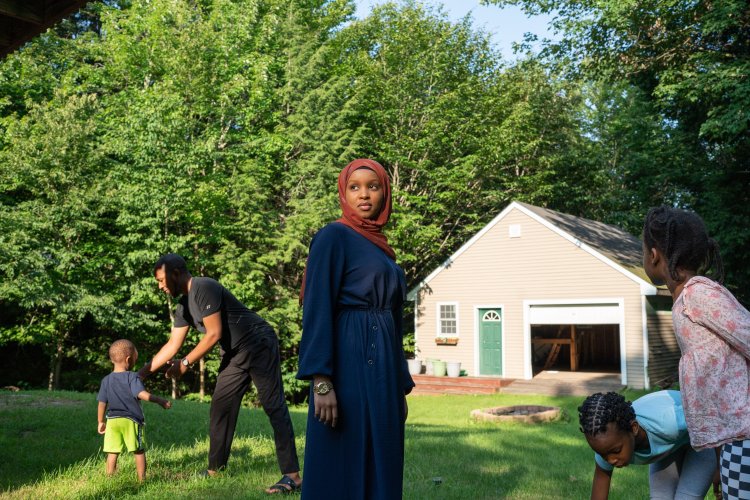
Ayra Abeza, 12, in the yard of the New Gloucester home her parents bought in January. Sofia Aldinio/Staff Photographer
Leaders of Maine’s immigrant community have been pushing local banks to offer Islamic mortgages for several years. The loans generally avoid charging interest directly by structuring payments to meet Sharia law and having the bank assume some form of full or part ownership.
Immigrant leaders recognized that many devout Muslim families in Maine were locked out of the U.S. banking system, said Claude Rwaganje, executive director of ProsperityME, a nonprofit that helps immigrants build financial independence.
“Other banks said there wasn’t enough demand for (Islamic) mortgages,” Rwaganje said. “But we said, whatever the demand, there is demand, and Androscoggin Bank stepped up.”
Androscoggin Bank saw the need for an Islamic mortgage program as an opportunity to continue the bank’s 153-year history of serving immigrants and to fulfill its modern B Corp mission to extend financing opportunities to women and minority populations.
“We felt it was incumbent upon us to ensure this community had an opportunity to participate fully in the economic system,” said Neil Kiely, bank president. “The more we can assist them to participate fully, the more it’s a win for the state of Maine.”
Kiely said it took more than a year to develop the mortgage program, working with ProsperityME, the Greater Portland Immigrant Welcome Center, and an expert in Sharia-compliant loan programs. They held community meetings in Portland and Lewiston. Hundreds of people attended.
“It has been an incredibly rich and rewarding experience,” Kiely said. “The Muslim community in Maine isn’t a monolith. It’s a diverse, talented, and industrious community, and we worked for months to build trust and understanding with them.”
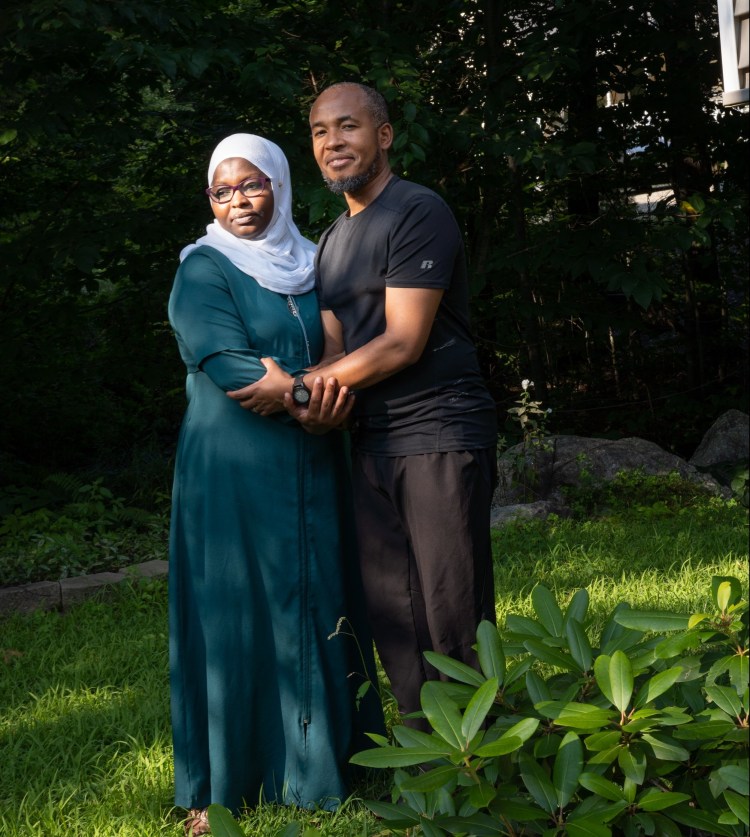
Sophie Mutamuliza, 40, and Adam Abeza, 41, purchased their first home with a Sharia-compliant Islamic mortgage provided by Androscoggin Bank, the first bank in Maine to offer this service to devout Muslims. Sofia Aldinio/Staff Photographer
As part of that effort, Kiely hired Ayesha Baye, an Ethiopian immigrant with nearly 20 years of experience working at Maine banks, to serve as a personal banker to Androscoggin’s Muslim clients. She helps them build credit profiles and take other steps toward buying a home.
BARRIER TO ECONOMIC PARTICIPATION
“Before this, there was nothing to offer my Muslim clients without compromising their faith,” Baye said. “I have Muslim clients who have been renting for 10 or 20 years, putting money toward rent instead of buying a home. They could have been homeowners by now.”
Many Muslims are not constrained by the ban on charging or paying interest, said Reza Jalali, executive director of the Greater Portland Immigrant Welcome Center. An Iranian-Kurdish immigrant who is Muslim, Jalali has engaged fully in the U.S. banking system, paying interest as a homeowner, landlord, and credit card user.
But for devout Muslims, avoiding interest keeps them from accessing a wider economic system where buying a house is a significant step toward financial security. According to the Koran, charging or paying interest is considered exploitative and sinful because it promotes inequality, increasing the gap between rich and poor.
“This is a barrier to a significant number of Muslims in Maine,” Jalali said. “Homeownership is about building individual wealth, generational wealth, and becoming invested in the community.”
Without access to financing through local banks, Muslims in Maine are being excluded from other services provided to customers who receive conventional mortgages, including business loans, retirement programs, and basic financial advice, Jalali said. Many immigrants face a variety of barriers in the economic system, including language differences and cultural prejudices.
“While not intentional, we’re leaving some people behind,” Jalali said. “The banking community and the larger community lose out.”
Some Muslims choose to borrow from community members, who pool savings and lend without charging interest, a practice Jalali called “underground banking.”
“But that only delays the American Dream, because the community can only buy one house at a time,” Jalali said. “In some cases, they go out of state, purchasing mortgages online, which can be risky and unhealthy because they are not building relationships with banks in Maine.”
There are a few basic types of mortgages that are considered riba, or interest, free under Sharia law. In variations of the most common form, the financial institution is co-owner and the home buyer gradually buys out the bank’s stake in the property. In other forms, the bank buys the property and sells it through lease-to-own arrangements or deferred payments with an agreed profit factored in.
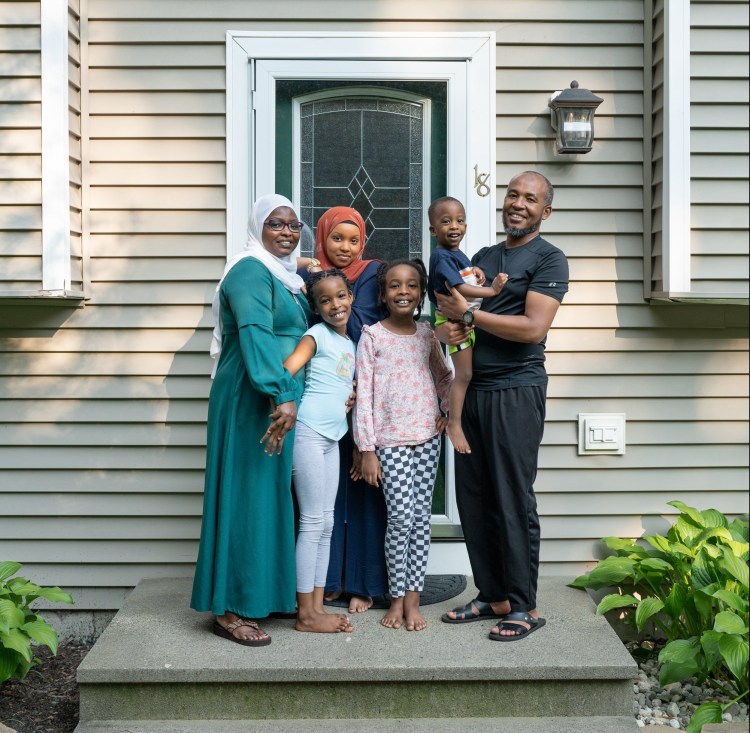
In January, the Abeza family, originally from Rwanda, was able to purchase their first home in New Gloucester. Sofia Aldinio/Staff Photographer
Kiely wouldn’t describe Androscoggin’s program exactly. “Through the use of alternative structures, the bank can work with homebuyers to reach a solution that complies with Islamic financing requirements,” he said. “It maintains the same economic costs and benefits to both the bank and client as a conventional mortgage.”
Non-Muslims also may apply for this mortgage program, Kiely said.
FULLY COMPLIANT PROGRAM
Kiely notified the Maine Bureau of Financial Institutions and the Federal Deposit Insurance Corp. about the Islamic mortgage program, he said, although neither has the authority to approve the program. Like other lending programs, it will be audited for compliance with state and federal laws.
John Barr, deputy superintendent of the bureau, said Kiely notified the state about the new mortgage program.
“It is common to have discussions with institutions as they develop new products,” Barr said in a written statement. “These discussions indicate to the bureau that the bank is conducting due diligence relative to risks and that the bank is talking to counsel about documentation and disclosure requirements.”
State banks are examined by the bureau or the FDIC every 18 months, at which time examiners have an opportunity to review actual loan documents to assess the loan portfolio and compliance with lending laws, Barr said.
Kiely said Androscoggin Bank will consider expanding its Islamic loan program to meet the borrowing needs of businesses, students, and others.
Rwaganje and Jalali hope other banks follow Androscoggin’s example. So do Sophie Mutamuliza and Adam Abeza.
They’re happy in their three-bedroom home on a wooded lot in New Gloucester, which sold for $395,000, according to several online real estate services. Their children play basketball in the driveway and chase frogs that escape a nearby pond. Now, many of their friends want to buy homes, too.
“They are inspired because they see that it’s possible and it won’t contravene the principles of their faith,” Abeza said.
“Now, we belong in Maine,” Mutamuliza said. “We are here to stay.”






